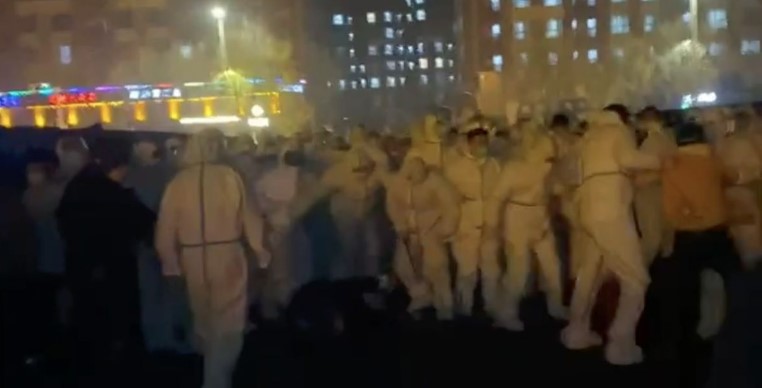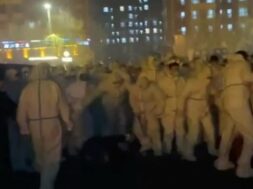
No pay, Zero Covid: China’s frustrated Apple staff violently clashes with police
Virendra Pandit
New Delhi: With the fresh outbreak of the pandemic infections, the Chinese government’s brutal Zero Covid strategy has turned into a force multiplier for millions of people to vent their frustration over continued hardships, which manifested when hundreds of workers at Apple Inc.’s main iPhone-making plant violently clashed with security personnel on Wednesday.
Tensions boiled over after almost a month under tough restrictions at the largest Foxconn Technology Group factory, employing over 200,000 employees, in Longhua Subdistrict, Shenzhen, at the Longhua Science & Technology Park, a walled campus sometimes referred to as “Foxconn City.”
According to media reports, hundreds of workers streamed out of their dormitories early on Wednesday, jostling and pushing past the security guards whom they heavily outnumbered.
Some onlookers prodded the protesters to fight on, while others forced their way past barricades. In a rare instance, several slogan-shouting protesters surrounded and stoned a police vehicle.
Reports quoting witnesses said the protests started over unpaid wages and fears of spreading infection. In the ensuing chaos, several
workers were injured and anti-riot police rushed in to restore order.
In one video, irate workers surrounded a manager in a conference room shouting grievances and questioning their repeated Covid test results.
The violence at the plant in the central city of Zhengzhou reflects a build-up of tensions since the lockdown began in October. They have plunged many among the vast workforce into isolation, forced to subsist on spartan meals and scrounge for medication.
Many workers eventually fled the plant on foot last month. To woo them back, and get fresh recruits, Foxconn and the local government promised them unusually high wages with better working conditions.
These protests underscored how President Xi Jinping’s Zero Covid policy, envisaging swift lockdowns to stamp out the pandemic wherever it pops up, is increasingly weighing on the economy and throwing swathes of the global supply chain into disarray.
Beijing recently issued fresh directives ordering officials to minimize disruption and use more targeted Covid controls, but recurring outbreaks in major cities have forced local authorities to reimpose stringent curbs.
Violence has erupted sporadically across the Communist country over Covid restrictions. In May, hundreds of workers clashed with security personnel at Quanta Computer Inc.’s factory in Shanghai after officials barred them for months from contact with the outside world, while protests emerged in locked-down areas of Guangdong, the southern manufacturing hub.
The Foxconn situation is a reminder of the dangers for Apple of relying on a single vast production center in China at a time of unpredictable policy and uncertain trade relations. The company, now looking for new production plants and alternate supply chains, has zeroed in on India where it opened a new plant.
Zhengzhou is the site of Apple’s most critical production, churning out about 80 percent of its latest-generation handsets and the vast majority of the high-end iPhone 14 Pro units. Just ahead of the peak holiday season shopping, it warned this month that shipments of its newest premium iPhones will be lower than previously expected.
The sprawling Foxconn premises have operated for weeks within a “closed loop,” or a self-contained bubble that limits contact with the outside world and keeps some production going. Apple and Foxconn said they would replace staff who have fled the factory and resume full production at the earliest.














